Question: Do you know of a hybrid data platform that provides real-time insights and fuels AI model development?


Cloudera
For a hybrid data platform that offers real-time insights and trains AI models, Cloudera is a good choice. It lets customers ingest, process and analyze data in the cloud and on-premises environments. The platform offers a broad set of data services, including ingest, prepare, analyze, predict and publish, that enable real-time insights and accelerated machine learning. Cloudera's platform is used in many industries, including financial services, manufacturing and healthcare.


Databricks
Another good choice is Databricks, which marries generative AI to unite data, analytics and governance. It lets customers build, deploy and run AI applications directly against their data while keeping control and privacy. The platform is based on lakehouse architecture for scalable and unified data management, and it supports a broad range of tools and integrations. Databricks is good for customers who want to democratize insights and run AI applications efficiently.


Teradata
Teradata offers a cloud analytics and data platform, VantageCloud, that unifies and harmonizes data across an organization. It supports multiple workloads including AI/ML, lakehouses and data warehouses, and can be deployed in public cloud, hybrid cloud or on-premises environments. The platform's flagship feature, ClearScape Analytics, delivers faster answers and enables AI innovation, making it a good choice for customers who want to improve data-driven decision-making.


SingleStore
Last, SingleStore is a real-time data platform for intelligent applications. It unifies transactional and analytical data in a single engine with high-throughput streaming data ingestion and millisecond query performance. The platform supports multiple data models and offers flexible scaling options, making it a good choice for real-time analytics and AI workloads. With features like elastic scaling and high availability, SingleStore is a cost-effective option for scalable data management.







































